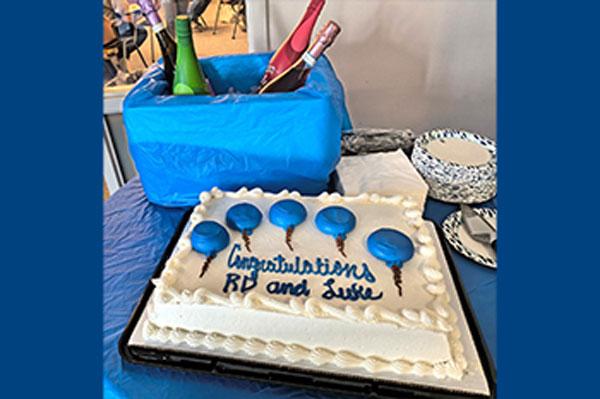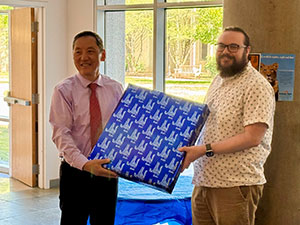
On April 17, 2025, Duke’s Graduate Program in Pathobiology and Translational Biosciences hosted a Last Day of Class ceremony in MSRB1 celebrating the two students who recently defended their theses: Robert D. “RD” Marek and Lucas “Luke” Wachsmuth.
Pathology Department Chairman Jiaoti Huang, MD, PhD, and Director of Graduate Studies Soman Abraham, PhD, honored the students by offering remarks recognizing their accomplishments thus far.
“Duke's program offered the opportunity to work with many different principal investigators from several clinical departments,” said Marek. “I was excited to work in a lab focused on translatable research, with strong connections to the clinic.”
Wachsmuth, who is attending Duke School of Medicine, was unable to attend the event.
When asked why he chose to pursue his PhD at Duke, Wachsmuth replied, “The people are really what brought me to Duke. The students and faculty here are incredibly passionate, hard-working, and intelligent, and the kind of people who you want to work and be friends with!”

Duke's PhD graduate program was established in the early 1960s with the goal to train investigators to understand and solve fundamental problems in experimental pathology. Our graduate faculty are united by their pursuit of increased knowledge regarding disease processes, particularly the molecular basis for disease. In this way, departmental researchers can translate experimental findings into improving medical practice.
Since Pathology is the only clinical department at Duke University to award a PhD degree, we offer research faculty from other Clinical Departments the opportunity to join our Graduate Faculty. Thus, our pool of Graduate Faculty originates not only from Pathology but also from the Departments of Surgery, Medicine, Neurosurgery, Pediatrics, Ophthalmology, Radiation Oncology, etc. As a result, our students are exposed to research targeting a broad range of human diseases at the molecular, cellular, tissue, or organismic levels. Research topics covered include cancer biology, vascular biology, genomics, host-pathogen interactions, inflammation, immunology, signal transduction, immunotherapy, and vaccine design. Read more about the program here.